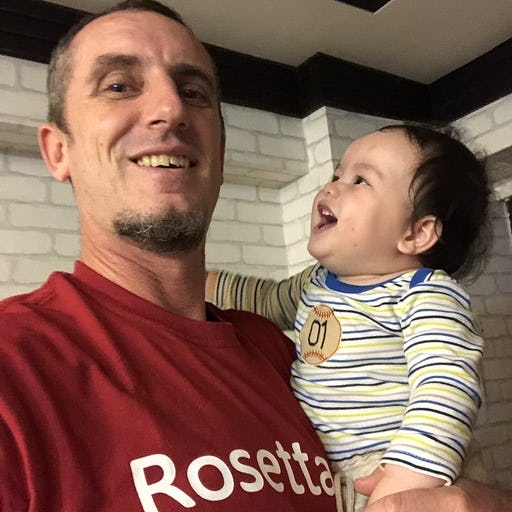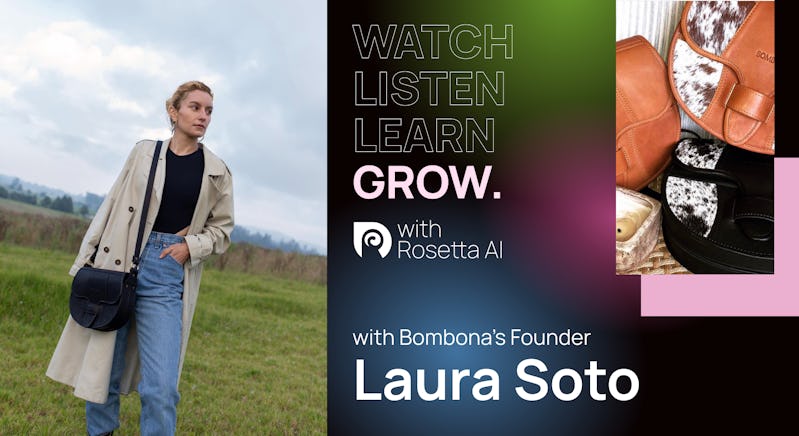Welcome to Watch Listen Learn Grow
This video series is about local business people who make fashionable products that they’re passionate about and then figure out how to sell online.
Our guest is Laura Soto, a Colombian native and long-time resident of Paris, now living in Taipei. Her brand is Bomboná, and she creates handcrafted luxury bags as a side project to her full time job as Senior Internal Auditor for a top company in Taiwan.
Watch Listen Learn Grow is produced by Social Media Coordinator Jerusha Sanchez and hosted by Content Strategist Ian McKinnon. If you have questions or would like to be featured on WLLG, email jerusha@rosetta.ai.
Transcript below
Ian: So Laura, welcome to Rosetta AI and tell me a little bit about your brand!
Laura: Thank you so much yes so our brand is called Bomboná, we’re a Colombian Artisan Luxury Brand. We focus on leather goods and we make all of our goods in Colombia. We associate with Artisans from the Narino region, that's near Ecuador.
Our biggest purpose is that people know more about Colombia and that they're motivated to know more. And just to share, you know, our heritage and for people just to value and to appreciate our handicraft.
Ian: That's super cool. I think that handcrafted stuff is more attractive than ever. I know I have friends who are into it too. But you know what I'm really curious about is how you started. How did you decide that you wanted to do an online business?
Laura: Yeah well that's a very good question. The first thing is that I'm Colombian and I've been living abroad for 17 years and every time I was back in Colombia yeah I was I really started to appreciate more and more Colombian handicrafts and I was thinking I wanted to do a business out of that because people sometimes don't know much about Colombia or they might have a bad image so I wanted people to just to discover Colombian leather which is an amazing leather. I think people think about, you know, Italian leather but they maybe don't know much about Columbia leather. So I decided to create this brand and then how did I decide to make it online?
Ian: Yeah! Or did you ever have an offline shop? Or did you go straight online?
Laura: Actually no. I thought the way for more people to be able to discover the brand was online.
Ian: Makes sense yeah.
Laura: It would be just a way for more people to know about Colombia and to get interested in it. So for me it was a very easy decision to go online.
Ian. Okay cool. So you've got a pretty interesting brand name I'm not quite even sure if I want to try to pronounce it again. How do you pronounce it?
Laura: Bomboná!
Ian: Bomboná! So what’s that mean? What’s that all about?
Laura: Yeah that's such a good question. So I've lived abroad and I started living in France then mainland China and Taiwan. I wanted to find a name that can be pronounced in different languages because I thought then it would be hard for people to remember. I started getting interested in some Colombian indigenous dialect names and I was really searching and searching and it was not easy to find one that was easy to pronounce. And then I was looking at the map of Colombia at the Nariño part of it which is where we do the bags and I found this place called Bomboná and I was like wow this is such a beautiful name then I started searching about it and it's kind of a historical place there was a some battle there. So I mean a lot of people think it's a historical place and I thought it would be easy to pronounce and it reflects Colombia.
And then the other thing is that I thought the visual part of the B and the O will be uh kind of
visually beautiful and also the B will be like the eight in Chinese culture which is a lucky number and the rounded shapes which means like “completeness and not lacking” in Chinese culture.
Ian: So you were considering the market in Taiwan.
Laura: Yeah definitely. I mean I live in Taiwan so I was thinking also I want people in this market and in this culture to be able to recognize my brand and to like it visually so yeah I'm very I was very excited to to choose this name.
Ian: So you're thinking about where you came from and developing your brand, but
also localizing it for where you are now.
Laura: Yeah I want different people to be able to recognize the name because some brands will be very hard to pronounce in some languages.
Ian: Is there like a transliterated, if that's the right word, version of Bomboná for Taiwan?
Laura: Yeah I have characters for it. My husband who's Taiwanese, suggested “Bona Bao” but actually we didn't use it that much. Bomboná isn’t that hard to pronounce.
Ian: Yeah it’s mellow. So… you’ve come this far and you've had some success, and you've got your business going but along the way can you think of your your biggest blocker
that you came across? And how did you overcome it?
Laura: Yeah such a good question. I think the biggest thing at the beginning was just to kind of change the mindset like I thought everything needed to be perfect and you need to be under control before you make any step for my business. But then I just had to kind of accept that as part of the process and kind of feel comfortable to make mistakes and to analyze the mistakes to reflect on them and to just to decide on another course of action. So I think that was like a mindset thing for sure. That was something I needed to work on.
Ian: Are you a perfectionist?
Laura: Yes, yeah yeah. And sometimes you don't feel comfortable. And you think what if it doesn't succeed what if people don't like it but then you need to try it and there’s no way to know if it's gonna succeed if you don't try.
Ian: Right. So just just a little tangent here. I know this is your side gig because you have another job.
Laura: Yeah I have another job.
Ian: Just tell me a little bit about what you do? What’s your other life?
Laura: Yeah in my other life I studied law in France and I did a Master's in international business law and I work as an auditor doing technology protection and compliance so it has
nothing to do with leather.
Ian: And not even marketing.
Laura: Yeah, not even marketing which is so important in this business.
Ian: Which is kind of what we're going to be talking about today.
Laura: Yeah because you were asking about the hardest parts of doing the business so
I think another hard part was just to realize that there's so many aspects of the business and you you don't have experience in all of them then you need to feel comfortable to learn a bit about each part and try to do things on your own because one day you will grow you'll have people doing each area maybe who are specialists but you still need to understand all the areas of your business.
So I think being open to learning and trying and at the same time being open to asking for help, that's a very tricky part. So for me marketing is definitely the hardest part because there's so many channels and then you know so if you haven't been in marketing you don't know much about targeting the audience all those channels there's so many things to learn.
Ian: It rings true for me because I know that when we're looking for people in the marketing department we were looking for people who we call “t-shaped.” T-shape refers to across the board for all those different things they've got a little bit of knowledge, right. But they go deep on one thing. I think that's the trick. I think you do have to not be afraid to be familiar with every part of it and experiment and not be afraid to fail.
Laura: Yeah definitely yeah just accept the process that it will be you know uncomfortable sometimes that was the hardest thing. One of my good Colombian friends who has worked in fashion for 10 years, she just told me the first year is about investing in your brand and it's not about making money and I really like that. I was thinking this is my issue but then I knew that “okay this is normal” I just need to invest in the brand.
For business the way you, the way you communicate, that's what will build your brand.
Ian: So yeah so let's just talk about some of those things that you have to do as a marketer. Are you doing Facebook ads?
Laura: Yeah I started doing Facebook ads. I find it so very hard!
Ian: Yeah it's getting harder.
Laura: Yeah it's getting so it's very hard. Everyone says you should use “interests,” you should make ads more specific right? So that's the way I was doing it but then you read the Meta newsletter saying oh no it's better if you use these demographics and this country, and really they're telling you to make it broader!
Ian: I know. We run ads here too and the advice we get from Meta is a bit of mystery to me too, I gotta say. What we’ve learned is you have to experiment. Like that prospecting phase is the key. You gotta put some time into learning what's working for your audience and what's not and then do the retargeting of course. We’ve had more failures than successes.
Laura: They say you can just analyze the data but I'm not sure it’s the truth or it's because I'm having some issue, or I'm not getting all the data I should get but I find it's not easy. I want to get the insights I need to improve the ads and target the people people who are
responding better but I found it not that easy to get those insights.
Ian: Yeah it's not easy. I think it's a long game. I think you gotta be prepared to uh to put some time into it. But also think outside the box nowadays. We’re hearing from our clients
here that they're not getting the same return on their ad spend as they used like three or four years ago. It’s done. The glory days of Facebook ads where you would put 100 in and get like a thousand dollars back on your investment, that’s finished.
But there are other ways. One of the ways that we're helping people is to maximize the
conversions that they're getting on their website. Whatever traffic they have, they want to be converting it. Ultimately that’s what we try to help them with, increasing their average order value.
Like when somebody comes in to buy one bag, instead we recommend some stuff to them and they end up buying three bags.
Laura: Oh yes that’s great!
Ian: Yeah that’s the name of the game but you need a branded website. I know you have a website.
Laura: Yeah I have an official website...
Check back next week for our transcript of episode two where Laura explains what it took to get her website going on her own and why it matters!







